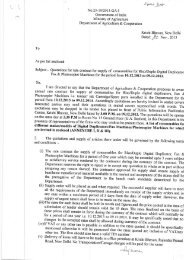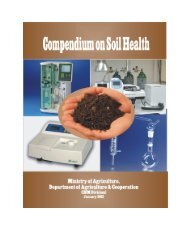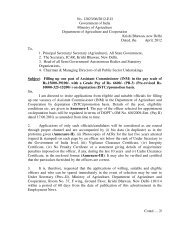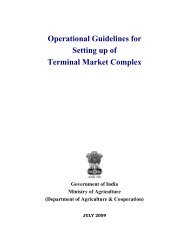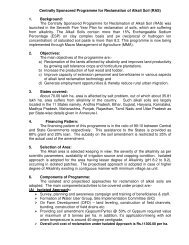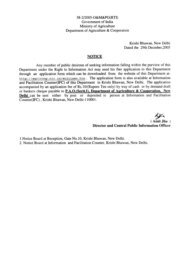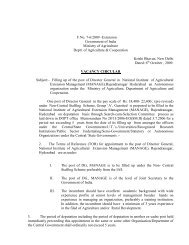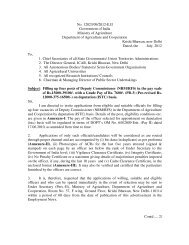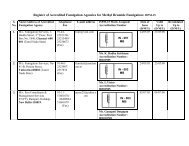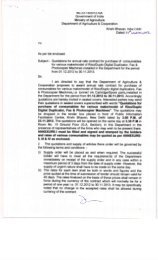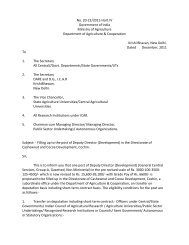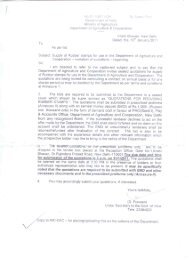Annual Report 2009-2010 - Department of Agriculture & Co-operation
Annual Report 2009-2010 - Department of Agriculture & Co-operation
Annual Report 2009-2010 - Department of Agriculture & Co-operation
Create successful ePaper yourself
Turn your PDF publications into a flip-book with our unique Google optimized e-Paper software.
<strong>Annual</strong> <strong>Report</strong> <strong>2009</strong>-<strong>2010</strong><br />
42<br />
(DAC) during the Kharif and Rabi seasons<br />
involving the state departments <strong>of</strong> agriculture<br />
and the CIPMCs.<br />
7.10 Implementation <strong>of</strong> the Insecticides Act:<br />
The Insecticides Act, 1968, regulates the import,<br />
manufacture, sale, transportation, distribution,<br />
and use <strong>of</strong> insecticides with a view to preventing<br />
risks to humans or animals, and for matters<br />
connected therewith. A Registration <strong>Co</strong>mmittee,<br />
constituted under Section 5 <strong>of</strong> the Act, is<br />
empowered with the registration <strong>of</strong> insecticides<br />
under Section 9 <strong>of</strong> the Act after verifying that it<br />
is efficacious and safe for use by farmers. During<br />
<strong>2009</strong>-10 (up-to December <strong>2009</strong>), 2,497<br />
registrations were granted. In order to bring<br />
about greater transparency and efficiency in the<br />
process <strong>of</strong> registration <strong>of</strong> pesticides, online<br />
registration <strong>of</strong> insecticides on the website <strong>of</strong> the<br />
Central Insecticides Board and Registration<br />
<strong>Co</strong>mmittee (CIB&RC) has been launched on 23<br />
September <strong>2009</strong>. The system enables online<br />
filing <strong>of</strong> applications for registration, status <strong>of</strong><br />
processing, reporting <strong>of</strong> deficiencies, and<br />
automated work flow <strong>of</strong> the registration process.<br />
7.11 A campaign to prevent the manufacture<br />
and sale <strong>of</strong> spurious pesticides has been<br />
launched by the DAC in co<strong>operation</strong> with all the<br />
state governments and the respective CIPMCs.<br />
7.12 The quality <strong>of</strong> pesticides is monitored by<br />
the Central and State Insecticide Inspectors who<br />
draw samples <strong>of</strong> insecticides from the market<br />
for analysis in the 61 State Pesticide Testing<br />
Laboratories (SPTLs) in 21 States and one UT.<br />
For states that do not have facilities for testing<br />
pesticides, facilities for testing samples at the<br />
Regional Pesticide Testing Laboratories (RPTLs)<br />
set up by the Central Government in Chandigarh<br />
and Kanpur, are available. In the case <strong>of</strong> a dispute,<br />
the samples are referred to the Central<br />
Insecticides Laboratory (CIL), Faridabad. In order<br />
to move towards greater quality assurance in<br />
pesticide analysis services, the CIL has obtained<br />
accreditation from the National Accreditation<br />
Board for Testing and Calibration Laboratories<br />
(NABL) for biological and chemical testing as per<br />
ISO/IEC 17025:2005. The RPTLs are also actively<br />
engaged in seeking accreditation.<br />
7.13 The Pesticides Management Bill, 2008,<br />
which is intended to replace the Insecticides Act,<br />
1968, to provide for a more effective regulatory<br />
framework for the introduction and use <strong>of</strong><br />
pesticides in the country was introduced in<br />
Parliament (Rajya Sabha) on 21 October 2008.<br />
The Parliamentary Standing <strong>Co</strong>mmittee on<br />
<strong>Agriculture</strong> laid its report on the Bill in Parliament<br />
on 18 February <strong>2009</strong>. The recommendations <strong>of</strong><br />
the Standing <strong>Co</strong>mmittee have been examined,<br />
and taking into account these recommendations,<br />
the <strong>of</strong>ficial amendments to the Pesticides<br />
Management Bill will be brought forth by the<br />
Government.<br />
7.14 Monitoring <strong>of</strong> Pesticide Residue at the<br />
National Level: The scheme, Monitoring <strong>of</strong><br />
Pesticide Residue at the National Level was<br />
launched in 2005 as a central sector scheme to<br />
collect, collate, and analyse data and information<br />
on a centralised basis, on the prevalence <strong>of</strong><br />
pesticide residue at the farm gate and in market<br />
yards. Samples <strong>of</strong> agricultural and food<br />
commodities, including animal produce, are<br />
drawn and analysed in 21 laboratories under<br />
different departments, state governments and<br />
agricultural universities. During <strong>2009</strong>-10 (up-to<br />
October <strong>2009</strong>), 6,780 samples, including<br />
vegetables, fruits, rice, wheat, milk, butter, meat,<br />
fish and marine products, spices, tea, honey, and<br />
water were analysed.<br />
7.15 Locust <strong>Co</strong>ntrol and Research: The Locust<br />
Warning Organization (LWO) under DPPQ&S,<br />
which monitors locust developments and<br />
activities over an area <strong>of</strong> 2 lakh sq. km <strong>of</strong> the<br />
Scheduled Desert Area (SDA) in parts <strong>of</strong>



